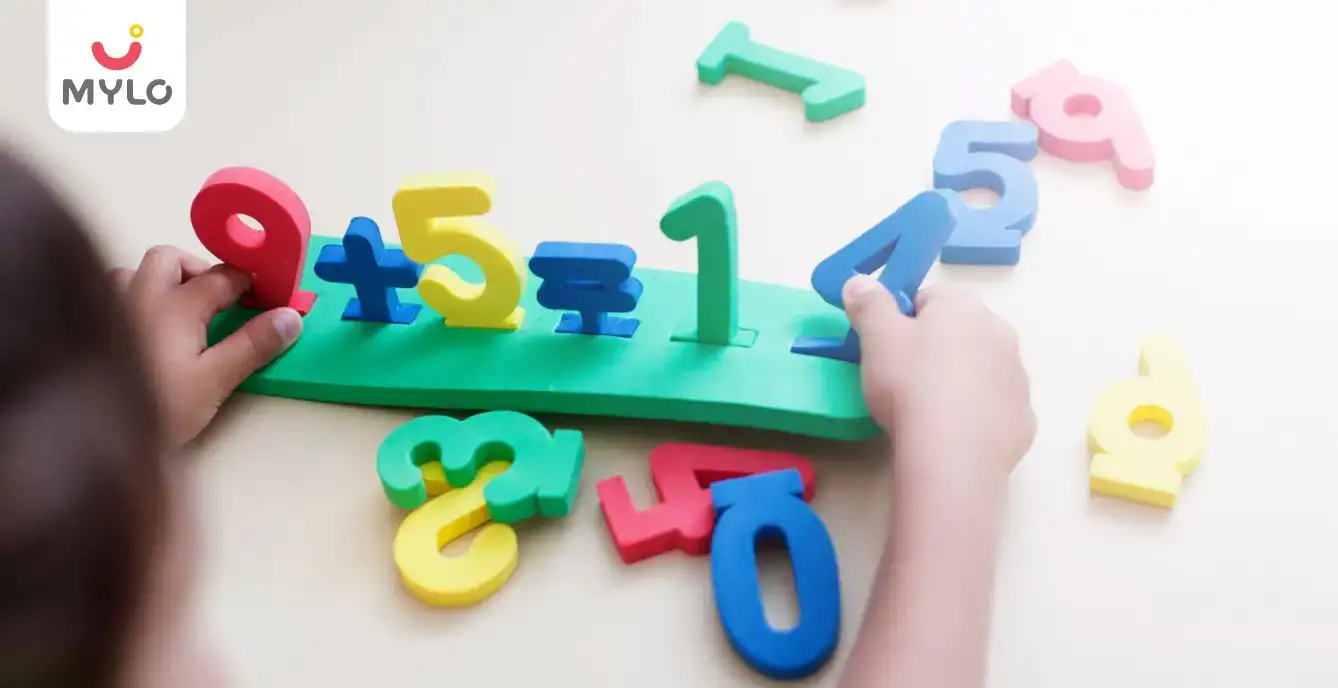Home

Sibling Rivalry: Causes & How To Handle Them
In this Article

Baby Care
Sibling Rivalry: Causes & How To Handle Them
Updated on 3 November 2023
What is Sibling Rivalry?
Sibling rivalry is when brothers and sisters are jealous of each other, compete with each other, and fight. Almost all parents with two or more kids worry about it. Usually, problems start right after the second child is born. Most of the time, sibling rivalry lasts through childhood, which can be very frustrating and stressful for parents.
There are many things that parents can do to help their kids get along better and figure out how to solve problems healthily.
Also, your kids will likely become close to each other over time. Your kids can learn essential skills like how to work together and see things from someone else's point of view by working things out with their siblings.
What Causes Sibling Rivalry?
There are many things that can cause siblings to fight:
-
Each child is trying to figure out who they are as a person. As they learn more about themselves, they try to find their own skills, hobbies, and interests. They want to show that they are not the same as their siblings.
-
They don't feel like they're getting an even split of your time, discipline, and response.
-
Children are more likely to get angry and fight when they are hungry, bored, or tired.
-
The way the family works is important. For example, a parent may treat a child differently because that child reminds them of a relative who was hard to deal with. This may happen unconsciously.
-
Children are more likely to fight if they don't have time to spend regular, fun time together as a family, like at family meals.
-
When parents are stressed, they may not be able to spend as much time or pay as much attention to their children. This can make sibling rivalry worse.
-
Stress in your kids' lives can shorten their tempers and make it harder for them to deal with frustration, leading to more fights.
How Can I Help My Kids Get Along Better?
-
To avoid unnecessary stress, avoid comparing your children to one another.
-
Make sure each kid gets some "downtime" every once in a while. Regular one-on-one time between each parent and each child is highly recommended. At the very least, aim for daily participation of a few minutes. You wouldn't believe the difference even 10 minutes of undistracted one-on-one time with your child can make.
-
Hold regular family meetings, especially if your kids are becoming older. The gathering is meant to show family members that their thoughts matter. The family gets together to air their grievances, discover common ground, and figure out how to move forward.
Sibling Fights: When to Step In
Taking a step back can help resolve a conflict between youngsters by allowing them to figure things out independently.
However, if the argument escalates into a fight, you should intervene to prevent any physical harm from happening. Because they are still developing emotional regulation skills, children may need assistance from an adult to remove themselves from potentially harmful situations.
Handling Sibling Fights Constructively: Tips
Keeping the peace during sibling disagreements can be made easier by following these steps:
-
Don't discriminate against any kid
-
You should stay away from negative comparisons
-
Figure out what's triggering the conflict
-
Make it clear what is expected of everyone by establishing ground rules
-
Organize your thoughts. This requires planning for both minor and major arguments
Problem-Solving After a Sibling Fight: Steps For Older Children
Wait until the kids have calmed down and are ready to talk again for the best results. Then do the following.
-
Inform your children of your plans
-
Inquire of both children what they believe the problem is
-
Instruct both children to express their desires
-
Think about it together
-
Judge the suggestions
-
Don't worry if you can't think of a solution right away
-
When you've settled on a plan of action and everyone is on board, implement it and evaluate the results. If things aren't getting better, try again.
Handling Your Own Emotions
When kids are fighting, it can help a lot if you stay calm. If it's safe and you don't have to act right away, it can be helpful to stop, count to 10, and then do something.
Those extra 10 seconds are often all you need to calm down. If this doesn't help, you could ask another adult to take care of things while you take a break.
When To Seek Help for Sibling Fighting
If your kids are often mean to each other or fight a lot, it's time to get them some help.
This kind of fighting can be very upsetting for kids and make it hard for them to get along with others in the future. So, if you're worried about how your kids act when they disagree, you should talk to a professional. Talk to your child's doctor first.
Children sometimes fight because they have a disorder like attention deficit hyperactivity disorder (ADHD), which makes it hard for them to control their behaviour. It's also a good idea to talk to a professional if you're worried about your kids' behaviour in general.
And if fighting makes you feel overwhelmed or stressed, getting help is essential. You could start by talking to your family, friends, and other parents. You can call a parenting helpline if you need help right away.
You may also like: https://mylofamily.com/article/mindful-parenting-practices-benefits-191928?



Written by
Shaveta Gupta
Get baby's diet chart, and growth tips

Related Articles
Related Questions
Influenza and boostrix injection kisiko laga hai kya 8 month pregnancy me and q lagta hai ye plz reply me

Hai.... My last period was in feb 24. I tested in 40 th day morning 3:30 .. That is faint line .. I conculed mylo thz app also.... And I asked tha dr wait for 3 to 5 days ... Im also waiting ... Then I test today 4:15 test is sooooo faint ... And I feel in ma body no pregnancy symptoms. What can I do .

Baby kicks KB Marta hai Plz tell mi

PCOD kya hota hai

How to detect pcos

Related Topics
RECENTLY PUBLISHED ARTICLES
our most recent articles

Diet & Nutrition
গর্ভাবস্থায় আলুবোখরা: উপকারিতা ও ঝুঁকি | Prunes During Pregnancy: Benefits & Risks in Bengali

Diet & Nutrition
গর্ভাবস্থায় হিং | ঝুঁকি, সুবিধা এবং অন্যান্য চিকিৎসা | Hing During Pregnancy | Risks, Benefits & Other Treatments in Bengali

Women Specific Issues
স্তনের উপর সাদা দাগ: লক্ষণ, কারণ এবং চিকিৎসা | White Spots on Nipple: Causes, Symptoms, and Treatments in Bengali

Diet & Nutrition
গর্ভাবস্থায় পোহা: উপকারিতা, ধরণ এবং রেসিপি | Poha During Pregnancy: Benefits, Types & Recipes in Bengali

Diet & Nutrition
গর্ভাবস্থায় মাছ: উপকারিতা এবং ঝুঁকি | Fish In Pregnancy: Benefits and Risks in Bengali

Diet & Nutrition
গর্ভাবস্থায় রেড ওয়াইন: পার্শ্ব প্রতিক্রিয়া এবং নির্দেশিকা | Red Wine During Pregnancy: Side Effects & Guidelines in Bengali
- ইনার থাই চ্যাফিং: কারণ, উপসর্গ এবং চিকিৎসা | Inner Thigh Chafing: Causes, Symptoms & Treatment in Bengali
- গর্ভাবস্থায় ব্রাউন রাইস: উপকারিতা ও সতর্কতা | Brown Rice During Pregnancy: Benefits & Precautions in Bengali
- Velamentous Cord Insertion - Precautions, Results & Safety
- Unlock the Secret to Flawless Skin: 7 Must-Have Qualities in a Face Serum
- Unlock the Secret to Radiant Skin: How Vitamin C Serum Can Transform Your Complexion
- Gender No Bar: 10 Reasons Why Everyone Needs a Body Lotion
- Unlock the Secret to Radiant Skin How to Choose the Perfect Body Lotion for Your Skin Type
- Top 10 Reasons to Apply a Body Lotion After Every Bath
- Communication in Toddlers: Milestones & Activities
- How to Improve Vocabulary for Toddlers?
- A Comprehensive Guide to Understanding Placenta Accreta
- Vulvovaginitis in Toddlers Causes, Symptoms and Treatment
- A Comprehensive Guide to Understanding Cerebral Palsy in Children
- Bitter Taste in Mouth During Pregnancy: Understanding the Causes and Remedies


AWARDS AND RECOGNITION

Mylo wins Forbes D2C Disruptor award

Mylo wins The Economic Times Promising Brands 2022
AS SEEN IN

- Mylo Care: Effective and science-backed personal care and wellness solutions for a joyful you.
- Mylo Baby: Science-backed, gentle and effective personal care & hygiene range for your little one.
- Mylo Community: Trusted and empathetic community of 10mn+ parents and experts.
Product Categories
baby carrier | baby soap | baby wipes | stretch marks cream | baby cream | baby shampoo | baby massage oil | baby hair oil | stretch marks oil | baby body wash | baby powder | baby lotion | diaper rash cream | newborn diapers | teether | baby kajal | baby diapers | cloth diapers |






